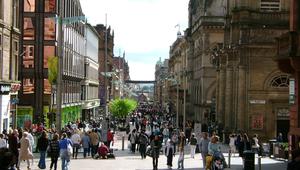Commentary
Dr Candice Howarth and Prof Alison Anderson
28 February 2020
Local media often constitute an important source of knowledge on climate change. Research published by Monash University and by Susan Moser shows that information on the local impacts of climate change is more effective at engaging audiences than national or global information. A recent study in the US tested different TV media reports on climate change found that short (i.e. less than 6 minutes) localised reports on the issue enabled viewers to gain a better understanding of the local and personal relevance of climate change to them. We know that a combination of ‘direct experience, vicarious experience (e.g. news media stories) and social construction’ affects perceptions and experience of climate change at the local level. However, there is a distinct lack of widespread engagement between local scientific institutions and local media which poses a real challenge for framing climate change as locally meaningful and relevant.
Environmental stories often get more coverage in local compared to national media, and local media constitute an important source of knowledge, particularly among older age groups, with TV news being the most accessed offline source of news and one of the most trusted media sources. An analysis published in 2011 of 10 UK regional newspapers found that over a quarter of climate change articles focused either on local impacts or local responses. As people’s sense of identity ties closely to place, local media has the potential power to facilitate and visualise climate action as relating directly to people’s lives – and the everyday environment they know and love. In doing so, there is a great opportunity to help bring both the impacts and opportunities to mitigate and adapt to climate change closer to communities. Local media can have a particularly important role in this by facilitating and visualising climate action locally; but to do this journalists need more and better access to scientists; their data, their findings and their points of view.
Whilst some research does suggest that ‘proximising climate change does not directly increase relevant individual action’, and projections of climate change at the local level can be subject to uncertainties, nonetheless local engagement with climate change is a vital part of enabling a sense of personal connection to a global and seemingly distant issue. Indeed, a survey into people’s attitudes to climate change following the 2013 UK floods found those affected were significantly more likely to be concerned about climate change than those that were not directly impacted.
We know that news stories with strong visuals and a human-interest angle, such as families or local businesses affected by flooding, propel climate change into the headlines. We also know that a combination of ‘direct experience, vicarious experience (e.g. news media stories) and social construction’ affects perceptions and experience of climate change at the local level. This is where local media can play a more prominent role in localizing climate change’s causes and impacts. A 2018 UK poll showed that three times as many people claimed they trusted local newspapers compared with social media and we know that scientists are trusted messengers when it comes to climate change. This likely relates to how people’s sense of self identify is connected to local places and institutions.
Scientists are expected to communicate their findings effectively, yet they often lack basic training, support and incentives to do so. An Ipsos Mori poll revealed that 90% of the British public considers scientists highly trustworthy, however 40% consider scientists poor at communicating. Whilst academics are encouraged to engage with media through their university press offices, this is mainly by contributing to press releases and responding to media enquiries. This is also partly down to the culture of the academic system, which values journal article publications and research income generation over proof or demonstration of the impact of science via public engagement activities and the media. Consequently, scientists can perceive public engagement activities to be time and resource intensive, where engaging with the public is seen as an add-on activity rather than integral to the research from the design stage.
Decisions on climate change tend to take place at the local level however science and evidence is often framed at the regional and international levels, leaving science unable to meet the needs of local decision makers and publics. Not only do scientists find it hard to find time and resource for climate change communications, they are also challenged in their ability to engage with local media by the very nature of the work they do, with science being an evidence-base often generated and framed at the global or regional levels. The media play a vital role in framing climate change, however little work has been undertaken to assess the extent to which local media outlets increase public engagement on climate change. This creates a gap for local media to fill and examination of the role that regional or local media play has been neglected.
Scientists must think about their work in more localised terms and simultaneously, local media outlets could do more to reach out to local scientists. A good example of this is Monash University’s Climate Change Communication Research Hub that is pioneering a new column called ‘Changing Climates’ featuring informative, fact-based infographics about local climate change, appearing in 23 local newspapers throughout metropolitan Melbourne. A ‘place-based’ framing offers an opportunity to foster strong, constructive collaborations between climate scientists and media outlets at the local level to help convey the severity of climate change impacts and solutions to reduce emissions and enhance resilience to climate risks.
Dr Candice Howarth is a Policy Fellow at the London School of Economics and Political Science’s Grantham Research Institute on Climate Change and the Environment. With a background in meteorology, climate change and environmental politics, she specialises in how co-production of knowledge and science communication can be used to better inform decision making in the context of climate resilience and sustainability challenges. She leads LSE’s work on the Place-based Climate Action Network (PCAN).
Professor Alison Anderson is a Professor in the School of Law, Criminology and Government at the University of Plymouth and an Adjunct Professor in the School of Social Sciences, Monash University. She has published widely on media coverage of environmental issues in journals such as Media, Culture and Society, Science Communication, Environmental Communication and Public Understanding of Science, and her latest book is Media, Environment and the Network Society (Palgrave Macmillan, 2014).
Candice and Alison published a joint paper on which this Commentary is based: Increasing Local Salience of Climate Change: The Un-tapped Impact of the Media-science Interface
Photo: Sam McGhee, Unsplash




